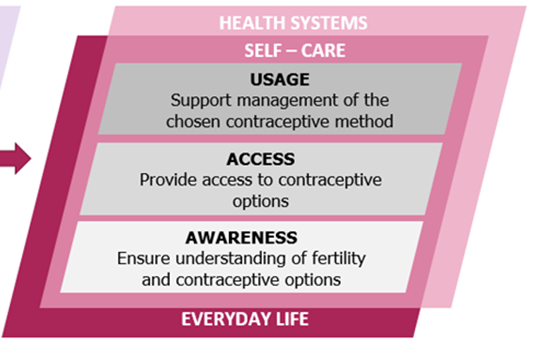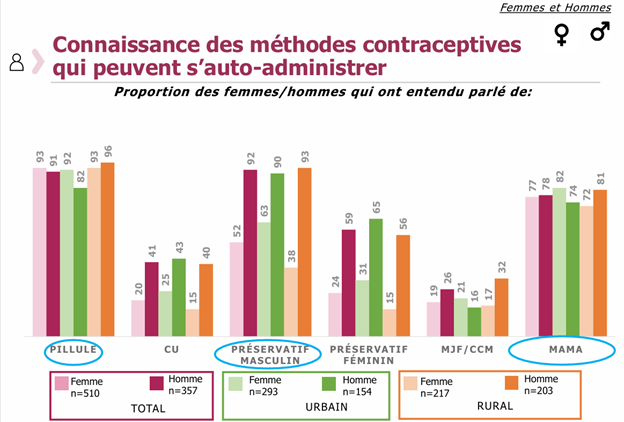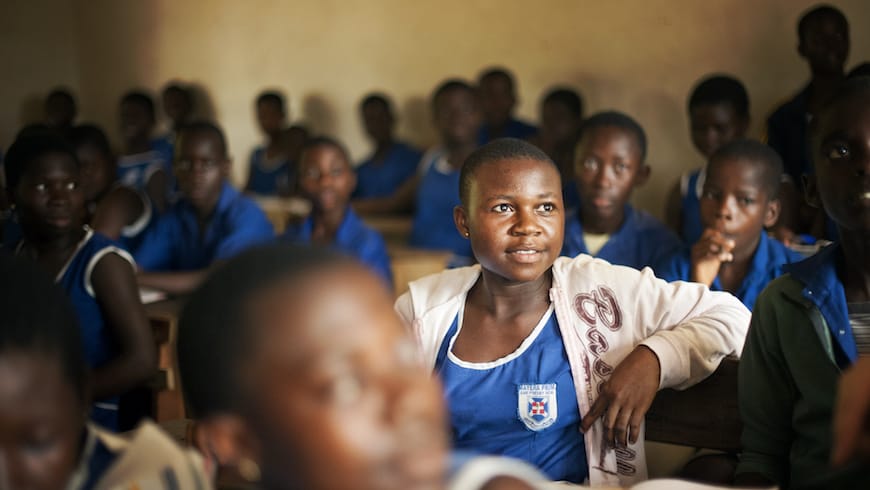Understanding the operationalization of self-care across different contexts
Goal
Support advancement and scale-up of self-care in Nepal, Niger and Uganda through improved understanding of user perspectives and context of self-care in different country settings. In Niger, the study aimed to:
- Examine perceptions of FP self-care among women and men.
- Describe the FP self-care behaviors and preferences of women and men.
- Explore service providers’ views on FP self-care.
- Understand community leaders’ perspectives on FP self-care.
Approach
R4S conducted a cross-sectional, mixed-methods study in Nepal, Niger, and Uganda. The study explored understanding of self-care among potential end-users and providers and examined women’s and men’s experiences with family planning and their preferences related to self-care interventions to identify opportunities for self-care within three stages of the family planning journey. The three stages were adapted from the three domains of self-care practices outlined by the World Health Organization, and included . The study included a survey with women (430 in Nepal, 510 in Niger, and 374 in Uganda) and with men (244 in Nepal, 357 in Niger, and 222 in Uganda), and in-depth interviews with women (35, 30 and 36 per country, respectively), with men (19, 13 and 12 per country), and with providers (12, 10, and 12 per country). There were also 12 in-depth interviews with community leaders in Niger only.
R4S also provided technical assistance to the FP Self-Care and Equity Working Group, a dedicated group within the FP Technical Working Group that the MoH put in place, in Niger and to the Self-Care Expert Group in Uganda. More information is provided in the Targeted technical and thought leadership section below.

Findings
Qualitative findings suggest that, despite some contextual nuances, self-care is broadly conceptualized in a similar way across the three countries, and that it is understood as using information, methods and services to space pregnancies and achieve a good life. Community understanding of self-care is not limited to methods amenable to self-administration; rather, self-care may be realized with a wide range of methods.

In examining opportunities for self-care along the three stages of the family planning journey, the study found that most surveyed women and men across countries had gaps in understanding of the fertile period. There was great interest in learning more about family planning through digital sources, with some contextual differences on preferred channels. For the access stage, the study found that between 36% and 86% of women who used or had used a self-administrable method as their last contraceptive method had initiated the method through health facilities. When asked about preferences for obtaining self-injection, pills or emergency contraception, the preferred source of supply among women was CHWs in Nepal (30-48%), and facility-based providers in Niger (46-58%) and Uganda (58-77%). For usage, most women with contraceptive side effects sought assistance, often from facility-based providers, and 24% to 47% attempted self-management. For both access and usage, most women rated having touchpoints with a provider or CHW as important when initiating or refilling self-injection, pills, or emergency contraception (79-96% in Nepal, 63-85% in Niger, and 50-91% in Uganda) and when managing side effects (between 84-94% across countries).
A research brief summarizing key findings and stakeholder recommendations in Niger (“Une étude exploratoire de l’auto-prise en charge en matière de planification familiale au Niger”).
Related items
-
- An Exploratory Study of Self-Care in Family Planning in Uganda
- Blog on “What does self-care for family planning mean to individuals and how can it be promoted in Uganda?” summarizing key study findings and takeaways from the Uganda study.
- Blog, on “Exploring Interest in Self-Care Approaches Among Youth: Survey Findings from Nepal and Uganda”
- Presentation on “Understanding the self-care interests, preferences, and opportunities for adolescent girls and young women in Nepal” at ICFP in November 2022
- Presentation on “An exploratory mixed-method study of family planning self-care in Nepal, Niger, and Uganda” at ICFP in November 2022
- Presentation on “Using holistic, inductive approaches to operationalize measurement of self-care for family planning” at ICFP in November 2022
- Global webinar, on “Understanding What Women and Providers Think of Family Planning Self-Care”, in November 2023 shared study results from the three countries.
- Global webinar, on “Listen up! Diverse voices comment on how individual self-care preferences and experiences can and should intersect with country policies and programs”, on December 1, 2023, through the Self-care trailblazer group’s Self-Care Learning and Discovery Series.
Partners: EVIHDAF and GRADE Africa (Niger), FHI360 and New ERA (Nepal) and MakSPH (Uganda)
Others Ongoing Projects

